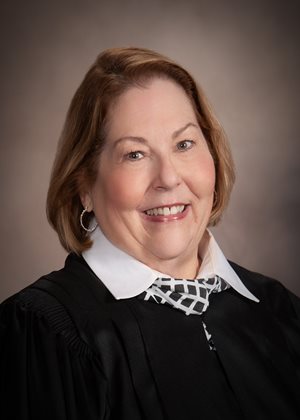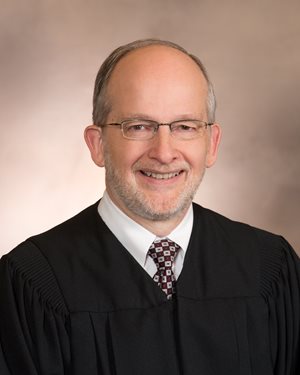TOPEKA—Two Kansas Court of Appeals judges have written chapters in books designed to help judges address bias in their courtrooms and promote fairness.
Chief Judge Karen Arnold-Burger co-wrote the chapter "Hearing All Voices: Challenges of Cultural Competence and Opportunities for Community Outreach" in the book "Enhancing Justice, Reducing Bias" published this year by the American Bar Association.
Judge Steve Leben co-wrote the chapter "Procedural Fairness" in the same book. Additionally, he was interviewed on the topic for the book "To Be Fair: Conversations About Procedural Justice" published this year by the Center for Court Innovation.
Chief Judge Karen Arnold-Burger
 Arnold-Burger's chapter focuses on implicit bias in the courtroom. She examines what judges can do to recognize and eliminate their own unconscious biases, as well as address systemic bias.
Arnold-Burger's chapter focuses on implicit bias in the courtroom. She examines what judges can do to recognize and eliminate their own unconscious biases, as well as address systemic bias.
As a trial judge who heard solely traffic cases and misdemeanor offenses—before she was named to the Court of Appeals—Arnold-Burger said she saw a disproportionate number of minorities as defendants in her courtroom, compared to the minority population in her community. This started her research into the reasons.
"And, as you can imagine," she said, "the reasons are varied but contain some common denominators."
She found that virtually all of the communities around the country that have looked at traffic stops and arrests have found that minorities are anywhere from two to 20 times more likely than white people to be stopped, searched and arrested, even though proportionally minority populations are not more likely to violate the law or possess illegal substances.
While police departments have started to take a hard look at their own practices, she believes that courts also have a role to play.
"Surveys on a national level have shown that minority communities have significantly less trust in the judicial system than white communities," she said. "Our obligation as judges is to first examine whether we are engaging in any behaviors that have a disparate impact on the minorities that appear before us, or are our systems set up in such a way that they have a disparate impact on minorities? And second, what are we doing to gain the trust of all of our communities?"
Studies have shown that those who have trust in the court are more likely to comply with its orders, she noted.
Recognizing that we all have biases is the first step, Arnold-Burger stressed. Cultural norms and biases are learned at an early age, and judges are no different than anyone else in being influenced by these, the chapter's authors write. Judges have to be open to examining their own biases and then seek out ways to address the effect of these biases on their decision-making.
Arnold-Burger and her co-authors also stress the importance of community engagement. By inviting the community to identify problems the judge or members of the court team may not be able to recognize, a court is taking a huge step toward increasing the trust and confidence of the minority community.
"My personal experience has been that minority groups recognize the courage needed to come forward and are encouraged by a judge's desire to correct any problems that exist," Arnold-Burger writes in the chapter.
Co-authoring the chapter with Arnold-Burger were Jean Mavrelis, a nationally known consultant on cultural diversity; and Phyllis Pickett, an attorney, mediator, and principal legislative analyst for the North Carolina General Assembly.
Arnold-Burger was appointed to the Court of Appeals in 2011 and named chief judge in January 2017. In 2015, she received the Burnham "Hod" Greeley Award from the American Bar Association in recognition of her work on the role of the judiciary in a democratic society and its importance to the rule of law.
Judge Steve Leben
 Leben's chapter maintains that if a judge focuses on fairness in the judicial process, people's attitudes about the judicial system improve, regardless of the outcomes of their cases.
Leben's chapter maintains that if a judge focuses on fairness in the judicial process, people's attitudes about the judicial system improve, regardless of the outcomes of their cases.
Leben said if procedural fairness is vigorously implemented, it will lead to a better justice system and improved public attitudes.
Procedural fairness focuses more on how judges run their courtrooms than the outcome.
"We train judges to make eye contact, to explain what's going on in the courtroom," he said. For example, they suggest that judges explain they are using a computer to access the file in the case being heard and are not working on something unrelated.
Procedural fairness also dictates that people appearing in court are given a chance to express their opinions; that legal principles are applied consistently and transparently; that individuals are treated with respect; and that those in a position of authority are caring, and sincere.
"For most people in the court, it's an uncomfortable environment. They're intimidated," Leben said. "If you're intimidated, you're not comfortable, so you don't ask questions. We have to ratchet back what is intimidating people."
There is substantial research, he said, connecting procedural fairness with overall satisfaction of the judicial system. What isn't as easily proven, he said, is how procedural fairness affects bias.
"We felt there was a relationship—that you could reduce perceptions of bias if not actually reducing bias—but we can't show this directly reduces bias," he said.
However, he said, studies have shown that when the principles of fairness are used in the way police officers are treated as employees, the prevalence of racial disparity in traffic stops and arrests declines. He also cited court studies showing that an emphasis on procedural fairness improves satisfaction with the court process for both majority and minority groups.
Leben and his co-author, District Judge Kevin Burke of Minneapolis, Minn., train judges nationally on procedural fairness. One method they use is to ask judges to videotape themselves in court and then watch how they work.
"You see things you have no idea are going on," he said.
Leben takes part in training new judges in Kansas and has conducted training sessions in 21 other states.
"We have more than 30,000 judges nationwide, so there are still plenty of people to get the message to," he said.
Leben was appointed a district court judge in Johnson County in 1993 after working as a private practice attorney. He was named to the Court of Appeals in 2007.
He was cited for his work in procedural fairness as the recipient of the 2014 William H. Rehnquist Award for Judicial Excellence, given by the National Center for State Courts. He is co-founder of http://www.proceduralfairness.org/ and also teaches as an adjunct professor at the University of Kansas School of Law.